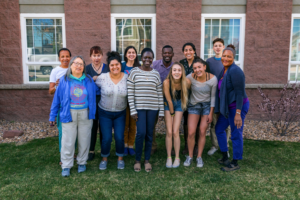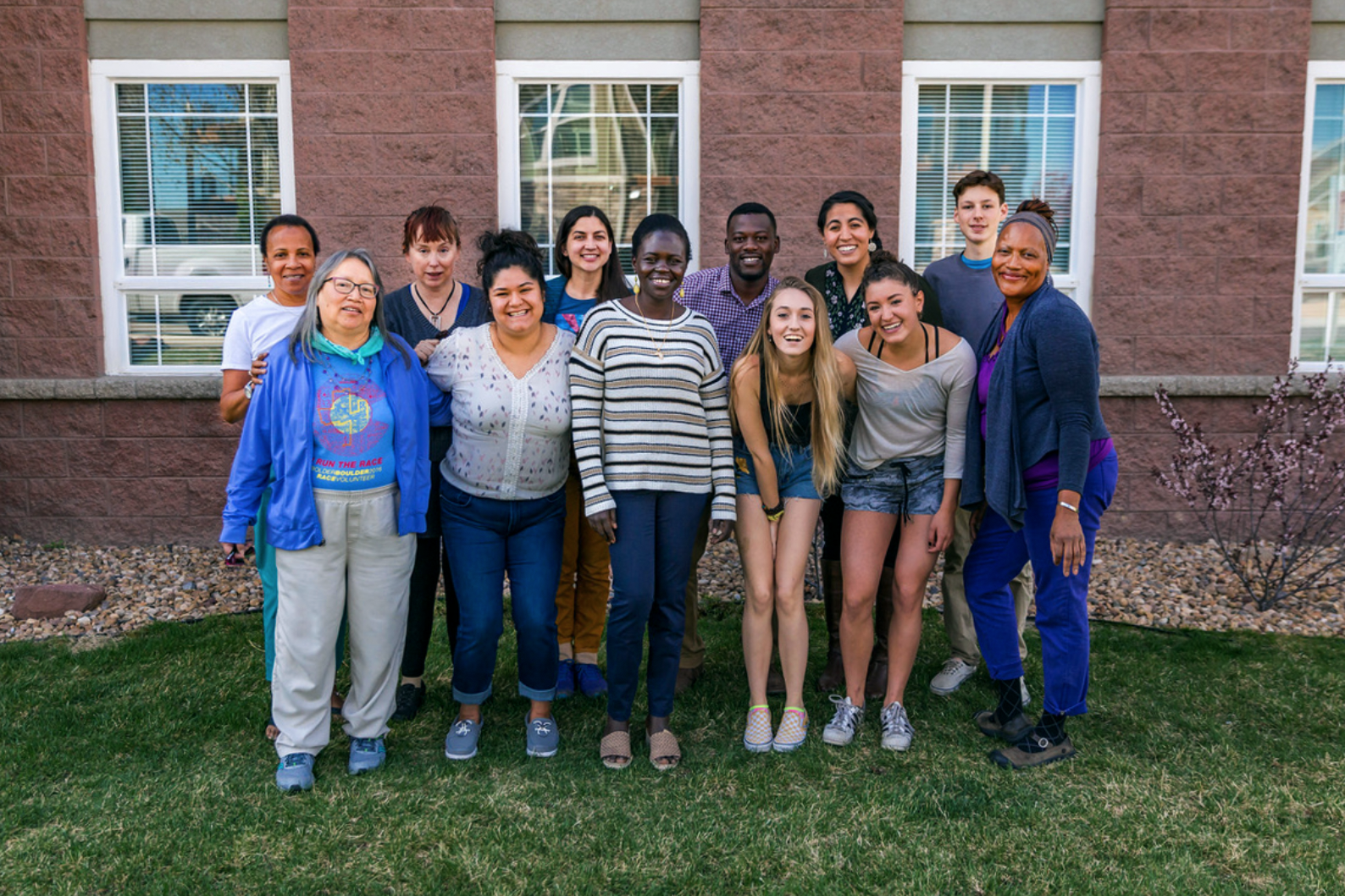“I am here as a Climate Justice Leader that is concerned with both climate change and social justice. Tonight, I ask that the City of Boulder please consider our recommendations to support efforts that build the leadership and capacities of communities like mine through resources, funds and partnerships.”– Andrea Nawage
“I am passionate about advocating for low-income communities because I have witnessed how we are often underrepresented in conversations about how to address climate change. It is important to me that we include people of all ages and all backgrounds to find solutions that are just and inclusive and effective in helping to create a better tomorrow.”– Foster Goodwill
“I am proud to be a Climate Justice Leader, with all of those standing behind me. I am here today to share my thoughts so that we can work together, not only to save our world but also to treat our communities with more dignity. My recommendation is simple – that we see communities in need as whole people. Ultimately, it is my hope that the City of Boulder is known not only for being a leader in sustainability efforts but that it is a leader in sustainability efforts that are deeply rooted in social justice.” – Angela Maria Ortiz Roa
The above words were spoken in front of the Boulder City Council on May 7, 2019. The speakers are part of the Climate Justice Leaders program, which was formed through a partnership with the Just Transition Collaborative (JTC) and Philanthropiece. That night, JTC presented the city council with a study session memorandum that detailed JTC achievements to-date and also provided recommendations for the council on how to fully integrate issues of climate justice into its Climate Action Plan.

JTC Climate Justice Leaders. Photo credit: Just Transition Collaborative
Since 2016, Philanthropiece has actively fostered relationships and partnerships that are addressing issues of climate justice on a local level. This effort is a recognition and acknowledgement that climate justice is fundamental to building stronger, more resilient communities. The term ‘climate justice’ was coined in recent years to describe the considerations of social and economic equity as they relate to sustainability and climate change action efforts. But climate justice is deeply rooted in movements addressing civil rights, human rights and environmental health and justice. In that sense, Philanthropiece’s move towards local climate justice issues is part of a more long-term commitment that has run throughout its programmatic history.
“In some respects, we’ve already engaged in climate related issues – doing environmental education with school kids in Laguna San Ignacio (B.C.S., Mexico), talking about marine conservation. And in Guatemala, we were looking at indoor air pollution issues and working with clean-cookstoves. We’ve been dipping our toes into this area for a long time,” says Joanie Knudson, Philanthropiece Co-Chair, Board of Directors.
Philanthropiece’s local climate justice engagement has focused on working in partnership and in sharing knowledge. This partnership model can be seen in its work with the Just Transition Collaborative. JTC was formed in 2016 after its founding members received requests from the City of Boulder for input regarding issues of social equity and community engagement, in relation to climate action. The City of Boulder staff, after drafting their Climate Action Plan, realized they had failed to incorporate these important factors into their plan. JTC made initial recommendations to the city and since then, has continued to evolve its focus.
“The way I like to describe our work is that JTC is almost like an incubator or a place where we can try out models and pilots and projects; these can embody what environmental and social justice could look like for cities and counties locally, and they can adopt or learn from them,” says Magnolia Landa-Posas, JTC’s Community Engagement Manager.
In the spirit of that work, JTC and Philanthropiece partnered to create the Climate Justice Leaders program. The program has focused on bringing in the voices of underrepresented community members to speak on issues of climate justice. Further, the program aims to encourage and support leadership skills within those communities.
“I’m hopeful that we get to the point where folks can recognize the knowledge and the strength and the power that they have amongst themselves to join these efforts. These communities have a lot of assets to offer and there’s a lot of resiliency there. But also, on the other side, it’s how organizations are putting forth efforts to make those folks feel more welcome. It’s just ongoing education, on both sides,” says Landa-Posas.
For another perspective on how to more fully integrate community members into considerations of social equity and climate justice, Philanthropiece has started conversations with the City of Longmont. As it started redeveloping its Sustainable Action Plan in 2016, Longmont realized early on the importance of bringing a diverse set of community members into the process.
“Through our planning process, social equity really came to the surface as we were going around, talking to different folks in the community around what their needs and desires were – things around access and equity and health and affordable housing,” explains Lisa Knoblauch, the Sustainability Program Manager for Longmont.
Longmont’s ability to involve community members so early on in their planning process is due in large part to the city’s focus on creating open communication with all of its residents. Carmen Ramirez, Longmont’s Community and Neighborhood Resource Manager, feels the groundwork for this type of communication with the community has been laid over a number of years.
“We’ve been doing community involvement since about 2003. We’ve developed that framework, those bridges, that opportunity to go out into the community and not just listen to those at the forefront. We’ve established a community that is more engaged and they expect to be part of the conversation,” explains Ramirez.
Having those deeps roots of communication has allowed the City of Longmont to more fully integrate social equity and climate justice considerations into its Sustainable Action Plan. It has also developed a Just Transition Survey that it is currently conducting with community members and will have follow-up workshops that continue to explore these issues with residents. As part of Philanthropiece’s belief in sharing knowledge and best practices, it initiated meetings with the City of Longmont and Magnolia Landa-Posas from JTC. JTC has contributed input as Longmont develops the workshops it will be offering to community members.
Moving forward, Philanthropiece will continue to foster relationships and look for areas in which it can make the most meaningful impact on issues of climate justice.
“We’re always looking at how we can come at it from many different angles and make breakthroughs on issues. We are a very grassroots organization. We like to get things done,” says Libby Cook, Founder and Co-Chair, Board of Directors for Philanthropiece.
•••
To learn more about just transition in Boulder County, please check out Just Transition Collaborative’s 2019 Green and Inclusive Report.
•••
Morning Glory Farr is Philanthropiece’s Editor & Content Manager and has served as an Advisory Board member since 2010.

